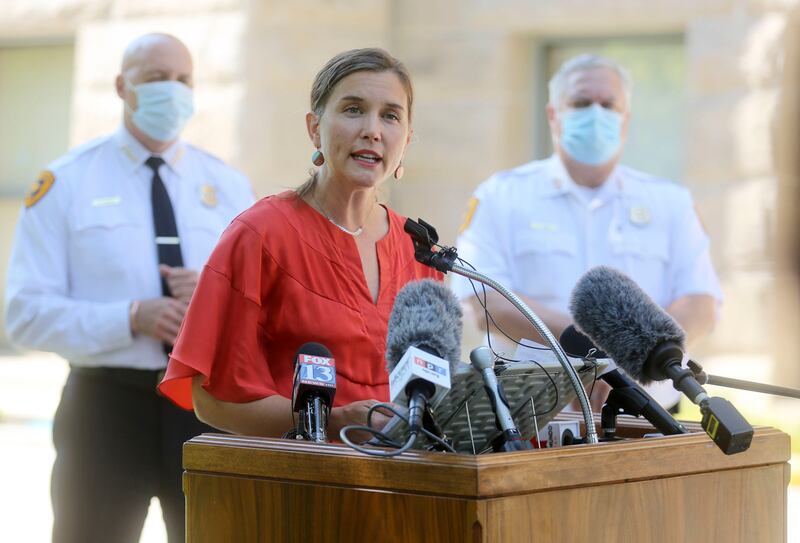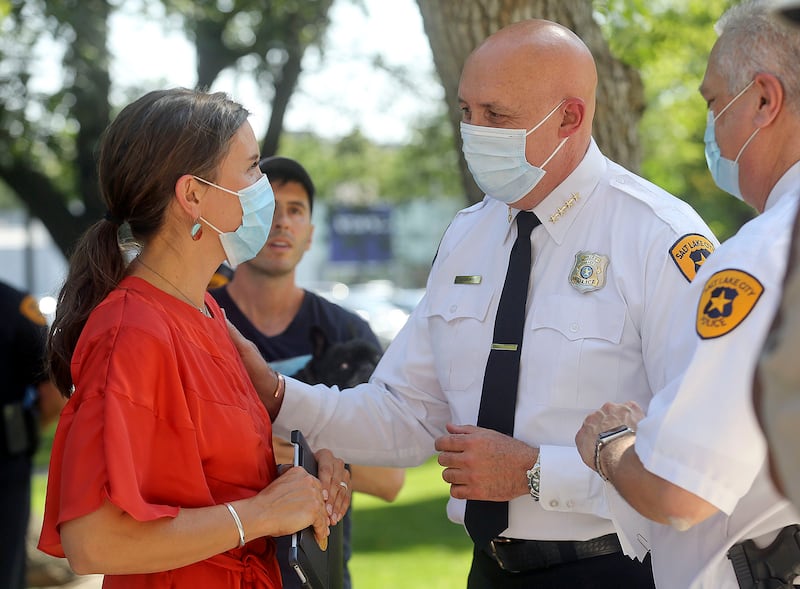SALT LAKE CITY — Standing outside the Salt Lake City-County Building in the scorching Monday afternoon heat, Salt Lake City Mayor Erin Mendenhall unveiled seven new policy updates that she said will make the city’s police department “the most well trained and progressive police department in the country.”
Issued by executive order just minutes before the news conference, the updates include changes to the city’s use of force protocol, how police conduct search and seizures, and how the department will discipline officers who either fail to activate or intentionally deactivate their body camera. The new policies will go into effect Sept. 5.
While the city’s policy has required officers to find it “reasonable to believe that a person will use a weapon to harm someone” to use force, the mayor said, police will now have to determine deadly force is “necessary” and the threat of death or serious injury is “imminent.”
“Necessary and imminent will be carefully defined,” Mendenhall said.
The order also underscores the importance of deescalation tactics, which Mendenhall said will be “mandatory prior to using force to effect an arrest, unless it would be unreasonable to do so.”
“Deescalation tactics are no longer suggested or preferred,” she said, adding that police are now expected to document all use of force in reports, “not just when it results in bodily injury,” and to do more to encourage deescalation among their fellow officers.

“Any officer who reasonably believes another officer is about to use force or other action that is illegal ... must, absent extraordinary circumstances, do whatever they can to interrupt the flow of events,” she said.
The mayor’s office also banned the use of deadly force to prevent someone from self harm.
The new search and seizure policies will now require police conducting a search without a warrant to have the person in question sign an updated consent to search form, while informing them of their right to refuse.
Mendenhall said the updated consent to search form will be easier to read and will be translated into Salt Lake’s other predominant languages.
“Right now that form is effectively only available in English,” she said.
Speaking after Mendenhall, Salt Lake Police Chief Mike Brown lauded the reforms, calling them “more than ink on paper.”
“Honestly this is not a radical shift for us,” he said. “We’ve always held change and evolution as a pillar of our training, and that is why we think we are the best department.”
The new policies are the latest in a string of police reforms from state lawmakers and local officials. In June, the City Council approved a budget for Salt Lake police that shuffled roughly $5.3 million towards the department’s social worker program, funded new body cameras and allocated money to a holding account to be used for future investment in minority communities. Days later, Gov. Gary Herbert signed into law a statewide ban on “knee-on-neck” holds.
Mendenhall also unveiled the Salt Lake City Commission on Racial Equity in Policing in June, an advising body intended to recommend changes to the department’s policies, budget and culture. Mendenhall said more reforms, both from the newly formed commission and her office, are in the works.
“These seven reforms are the beginning of our work, not the end. I hope and I expect that we will see additional reforms in the coming months,” she said Monday, hinting that changes to qualified immunity — the often criticized doctrine that shields police and government officials from being held liable for violations — is among the reforms her office is eyeing.
The announcement comes just one day after protesters denouncing the 2018 police killing of Zane James, a 19-year-old who was fatally shot in the back after robbing two stores, clashed with police in Cottonwood Heights.
The violent clash, which took place just blocks from where the shooting occurred, resulted in at least eight arrests, including James’ father, Aaron James. The response from Cottonwood Heights police drew condemnation from local groups including the ACLU of Utah, Alliance for a Better Utah and Darlene McDonald, a member of Salt Lake City’s Racial Equity in Policing Commission.
“Basically, they were armed and waiting for a fight,” McDonald said. “They literally instigated a fight with the protesters.”
Both the protest and the police response are being investigated by Cottonwood Heights city officials.
Mendenhall declined to explicitly comment on Sunday’s protest, but did tell reporters she hopes Salt Lake’s surrounding cities will also prioritize reforms.
“We invite other cities surrounding us — as all of our borders intertwine without much definition to the public eye — it’s important that we get on the same page about these police reforms and that the public are safe no matter where they are.”












